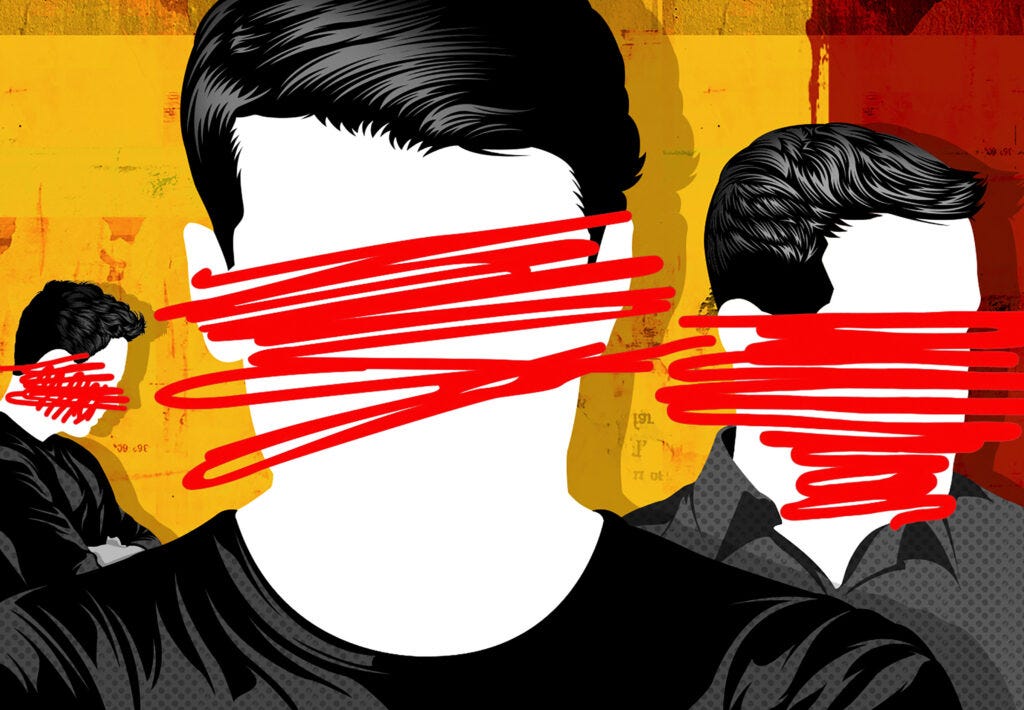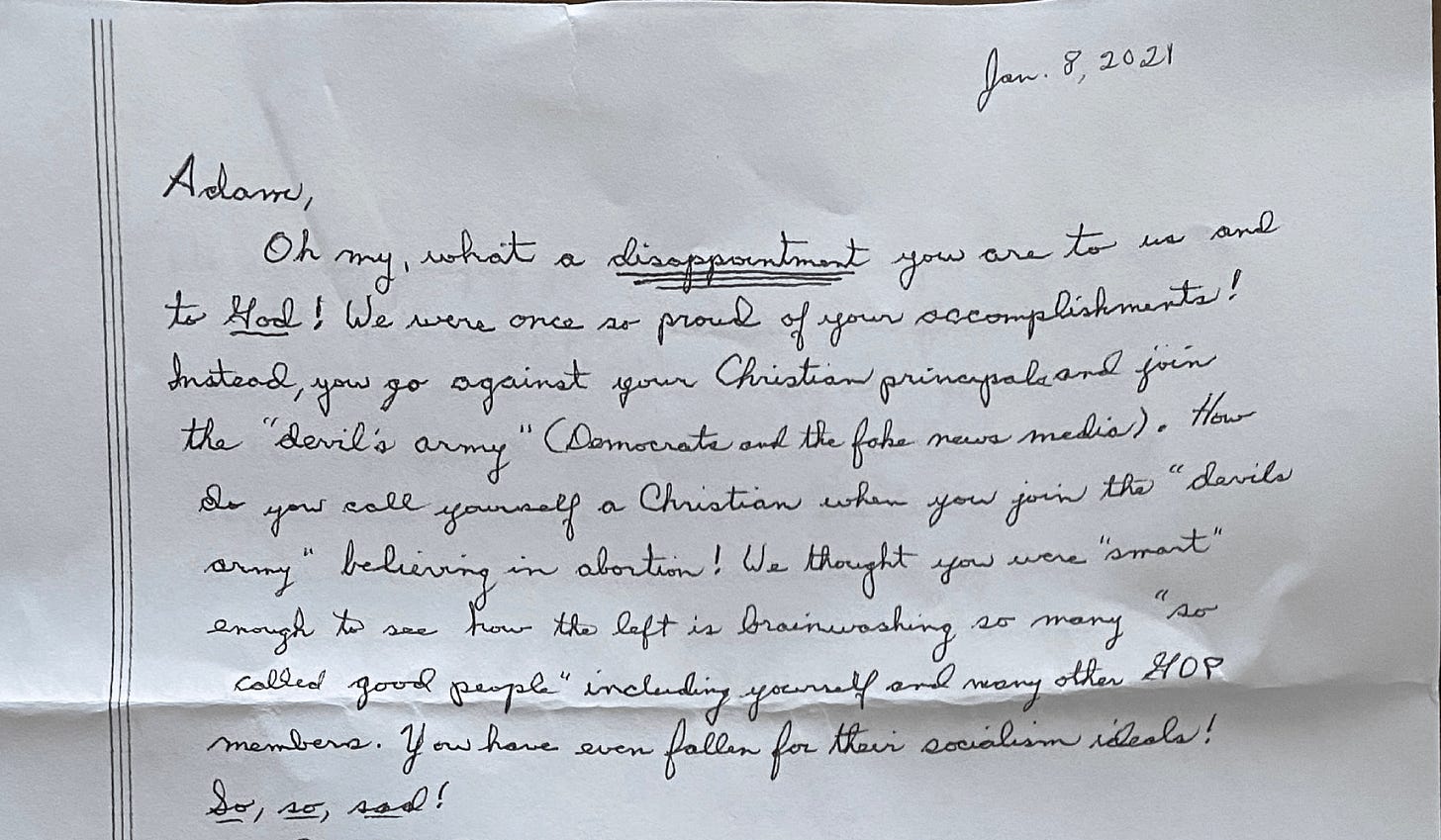According to Rep. Jim Jordan (R-OH), cancel culture is “the number one issue for the country to address today.” He made this startling statement to Fox News’ Maria Bartiromo, who responded, “It’s true.” So what is he even talking about?

The far-right has suffered a series of highly publicized setbacks of late. The Mandalorian’s Gina Carano recently was fired by Disney for her inflammatory and insensitive Instagram posts. Fox News cancelled Lou Dobbs’s show after his lies about election fraud exposed the company to defamation liability. Dozens of major corporations have suspended campaign donations to the 147 Republican lawmakers in Congress who objected to the electoral count. And perhaps most famously, Donald Trump was deplatformed from Twitter for his repeated lies about the election and threats to public safety. These actions have convinced many in the GOP that there is a liberal-leaning culture—-run by Hollywood, trial lawyers, and big tech—that is out to silence them completely, in violation of their rights of free expression.

And yet, it is this same GOP that has ensured that its own members pay a heavy price should they fail to pledge their undying fealty to Donald Trump. The GOP’s version of cancel culture includes the harassment and doxxing of election officials who stood by their states’ vote results despite heavy-handed pressure, veiled threats and disparagement online by the former president. It includes official state party censures of notable figures from Cindy McCain to Liz Cheney, and more recently in North Carolina and Louisiana against Senators Burr and Cassidy for voting against Trump in the impeachment. Families are not exempt either; Rep. Adam Kinzinger’s extended relations issued a scathing, public, and frankly bizarre condemnation of his impeachment vote, accusing him of joining the “devil’s army” of Democrats and fake media, with eleven of them disowning him.
Hypocrisy aside (as it must often be set with the GOP), the question of where to draw the line in the cancelation wars raises interesting legal and ethical questions and often turns traditional conservatism and liberalism on their heads.
Let’s get one thing out of the way first: “Cancel culture” is almost never about the First Amendment’s guarantee of freedom of speech.
Take Trump being deplatformed from major social media. The same conservatives who insisted it was the right of a bakery to refuse to decorate a cake for a gay couple’s wedding (on the grounds that it is their shop, their beliefs, and they make the rules) were quite quick to condemn other private companies like Twitter and Facebook for exercising their rights to enforce their own community standards. The far-right gets tangled up because the First Amendment exists as a curb on the government’s power to restrict speech, and not as a curb on private companies. Indeed, forcing Twitter or Facebook to host and distribute the president’s false statements, in violation of their own site rules, would likely be a violation of the First Amendment because the government doesn’t generally have a right to force private companies to distribute content.
Similarly, the fact that private companies are now acting against individuals whom they were previously supporting, whether with employment or with political donations, is not a free speech violation. Private companies are free to do with their money and their property what they want, as long as it doesn’t violate any laws. (Anti-discrimination laws protecting minority groups are a notable exception to this.) And those individuals who lost their support are free to take their speech to more receptive benefactors.
Liberals also need to be careful not to make the same fallacious free speech arguments, notably against the GOP state parties that are busy censuring anyone who stood against Trump. Lamentable and troubling as this is, those parties are organizations with their own free speech rights, and the state doesn’t generally have the power to peer inside them to regulate their rules or conduct absent a violation of law.
Without the straw man arguments around free speech, what “cancel culture” boils down to is something closer to “consequence culture.” Simply put, you are free to speak your mind and act like an jackass, but you cannot claim immunity from the consequences. Thus, alienating audiences, employers, or benefactors through repeated bad behavior and false or defamatory statements will reasonably result in your being fired, canceled or deplatformed. Ordinary people know this and practice restraint in their jobs and online; the famous or powerful may not understand this as well, but that doesn’t mean they get a free pass.
There is certainly a danger of this going too far. When the consequences demanded by online mobs significantly outweigh the harm of the condemned behavior, the results can quickly become unfair, even devastating. We cannot set aside, for example, the need for due process and a fair hearing of both sides on mere accusation alone. Some will use the power of the mob to act as judge, jury and executioner against others, and a chill will fall across everyone out of fear they might be targeted next. To hold to our values and prevent mob rule, we must demand a fair assessment of the alleged wrong and a fair forum to be heard, or the consequence might truly outweigh the perceived “crime.”
In each of the recent high profile cases of right-wing figures who were fired or deplatformed, they knowingly spread lies and misinformation or otherwise made abhorrent statements targeted at other people or groups. Contrast that to the punitive collective actions taken by state GOP parties against the handful of Republican moderates who painstakingly analyzed and audited election results, or sat through days of hearings or the trial to finally reach a decision that they knew would cost them politically.
The former represents a consequence culture, the latter the true cancel culture.





I much prefer the term consequence culture. For far too long, some people have gotten away with saying and doing terrible things without any consequences. We sometimes assume it's only famous people who get away with stuff, but, I'm sure we all know one or more insufferable people who seem to lead a "charmed life", getting away with being just an asshole, for whatever reason. One thing that 45 did, was bring that into very sharp focus, and collectively, the majority of us, at the same time said, enough. With all of the right's whining about not being able to freely and unapologetically be assholes, it's hard for me to figure out how the left got stuck with the title of Snowflakes. It's actually quite pathetic to watch. As if to solely prove our point, they've decided that this is the most pressing issue in the country right now, like nothing else matters except their comfort level. Forget the pandemic, the economy, climate change, systemic racism, etc. All that matters to them is themselves. But we knew that already.
It's only "cancel culture" if they're the ones being cancelled, not if they are doing it.